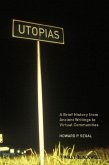Dieser Download kann aus rechtlichen Gründen nur mit Rechnungsadresse in A, B, BG, CY, CZ, D, DK, EW, E, FIN, F, GR, HR, H, IRL, I, LT, L, LR, M, NL, PL, P, R, S, SLO, SK ausgeliefert werden.
"Segal does a good job of surveying the history of utopias, particularly focusing on the connections with science and technology. Histories of this topic tend to highlight the religious or cultural motivations for writing about or creating utopian societies, but here the author expands the discussion to include virtual communities ... This text provides a unique approach for teaching history and the history of science. Highly recommended: general readers; lower-division undergraduates and above." Choice (1 February 2013)
"Segal brings considerable scholarship and experience to bear, particularly on the historical intersections between technology and utopia ... [He] covers several continents and many centuries, addressing key texts and thinkers ... [and] supplies impressive coverage and thoughtful interpretations." Times Higher Education (12 July 2012)
"A 'near perfect' account of utopias and utopian thinking of thepast, present, and future. Historian Howard Segal revisits utopianideologies revealing their perennial appeal, their use and misuseof technology, and their considerable power to reshape society,then and now."
--James Rodger Fleming, Colby College
"An expansive, entertaining and provocative introduction toutopianism and its practitioners ... Utopias captures both thewhimsical extravagance as well as the earnestness of attempts(western as well as non-western) to imagine better futures and thenactually create better societies across the ages ... [It] is boundto stimulate thought on the subject, and will appeal to a widereadership."
--Greg Claeys, University of London
"Segal offers a focus on 'western' expressions of utopianismwhile devoting substantial space to diversity. Hence we find theexpected discussions of literature from More to Bellamy and Wellsand beyond ... but there are also interesting examinations ofutopias from China, Japan, India, and Latin America; andsubsections on World's Fairs, professional forecasters, cyberspace,Megaprojects, social media, E-books, and George Lucas'sEdutopia."
--Kenneth M. Roemer, University of Texas atArlington
"The potential for good of science and technology, and theirmanifest dangers and pitfalls, are vividly evoked by Segal in hisaccessible account of utopias past and present. This is a work ofinsight and reflection."
--Barbara Goodwin, University of East Anglia









